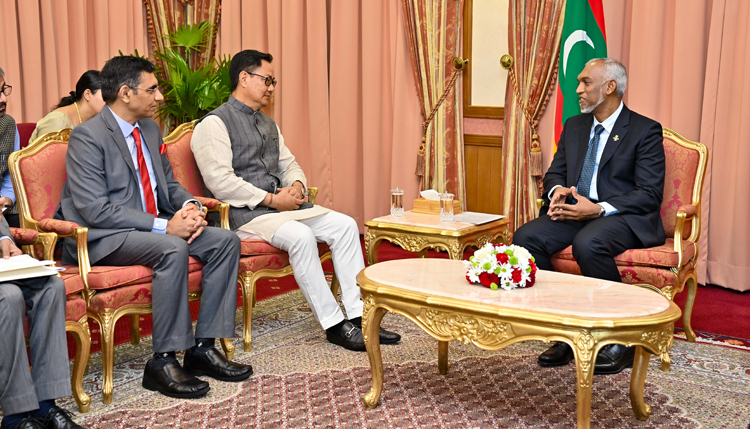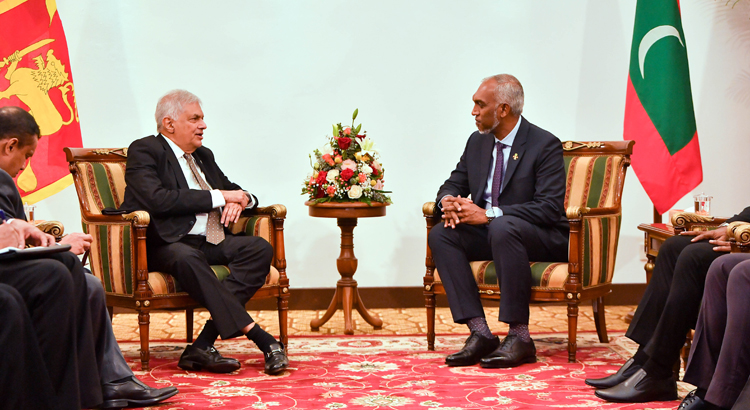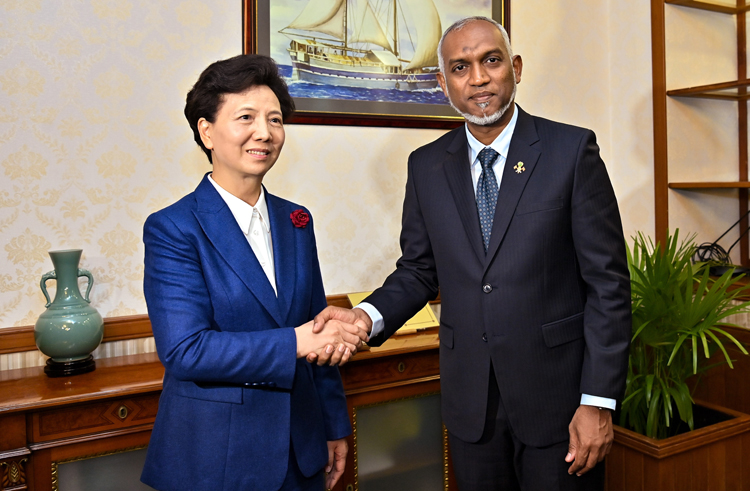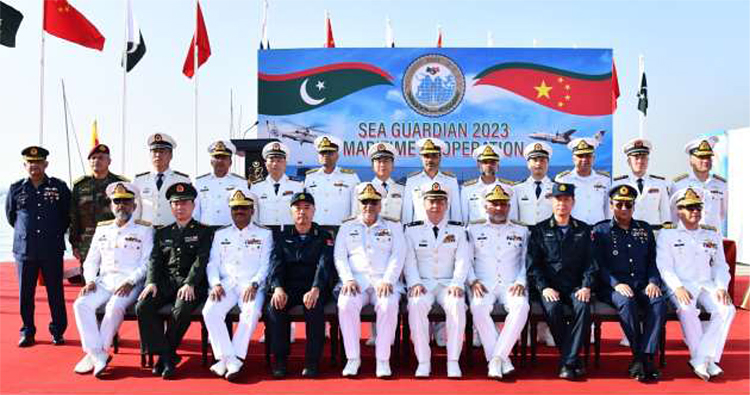INDIAN ARMED FORCES CHIEFS ON
OUR RELENTLESS AND FOCUSED PUBLISHING EFFORTS

SP Guide Publications puts forth a well compiled articulation of issues, pursuits and accomplishments of the Indian Army, over the years

I am confident that SP Guide Publications would continue to inform, inspire and influence.

My compliments to SP Guide Publications for informative and credible reportage on contemporary aerospace issues over the past six decades.
Navigating the Indo-Pacific Chessboard
Unraveling the Geopolitical and Strategic shifts from Maldives to Bay of Bengal
 |
The Author is Former Director General of Information Systems and A Special Forces Veteran, Indian Army |

The election of pro-China politician Mohamed Muizzu as the eighth President of Maldives this September was reported in these columns earlier, as also that in 2022, Muizzu told Chinese Communist Party officials while visiting Beijing that his party's return to office would “script a further chapter of strong ties between our two countries”. On October 2, 2023, China congratulated Muizzu for his victory. In his electioneering speeches, Muizzu criticised India indirectly for influencing decisions of the outgoing Solih Government. He also said he would not allow foreign troops in Maldives – oblique reference to Indian helicopters and personnel, positioned to evacuate the sick from distant islands in the archipelago.
Shortly after taking oath as President, Muizzu said, 'The country will not have any foreign military personnel in the Maldives. On the first day in office, Muizzu formally asked India to withdraw its troops from Maldives.
For his oath taking ceremony and inauguration of the new government on November 17, 2023, Muizzu invited Prime Minister Narendra Modi. India, however, was represented by Union Minister of Earth Sciences Kiren Rijiju. Other foreign dignitaries also included Sri Lanka President Ranil Wickremesinghe and Special Envoy of the President of China and State Councilor Shen Yiqin (who visited Maldives in 2014 when Muizzu's mentor Abdulla Yameen was President). Pakistan was represented by Murtaza Solangi, Federal Minister of Information & Broadcasting and Parliamentary Affairs.
Shortly after taking oath as President, Muizzu said, "The country will not have any foreign military personnel in the Maldives." On the first day in office the next day, Muizzu formally asked India to withdraw its troops from Maldives. His office issued a statement saying, "The President formally made the request when he met the Minister of Earth Sciences of India Kiren Rijiju, at the President's Office earlier today.” This was despite the fact that India is developing almost 40 projects in Maldives, including the $500 million Greater Male Connectivity Project.

Earlier in the week, Muizzu had told media that his intention was not to upend the regional balance by “replacing the Indian military with Chinese troops”. But China's Peoples' Liberation Army (PLA) personnel are already in Maldives in the garb of civilians in development projects (well known to Muizzu) – as is the case in all foreign Chinese ventures. This is also a lesson for India. Knowing the politics within Maldives and hardcore China shift during the presidency of Abdullah Yameen, why did we not place civil helicopters and civilian pilots (or naval pilots on deputation) in Maldives for the task? Doesn't this show lack of forethought and foreign policy deficit on our part?
A pro-China Maldives must be viewed in concert with Pakistan in Beijing's lap and Sri Lanka committed to China's BRI and docking of PLA Navy (PLAN) ships and submarines at Colombo
Spread over 90,000 sq km, Maldives is located 600 km off India's coast and 750 km south-west of Sri Lanka. Global east-west shipping lanes pass its 26 atolls and 1,192 islands stretching around 800 km across the equator. Its geostrategic value is from three of the most important SLOCs through which most of India's trade and oil requirements pass, apart from its close proximity to India and Sri Lanka. As President, Muizzu inspected the 'Greater Male connectivity project on November 20. He had previously pledged to expedite the completion of the Greater Male Connectivity - Male to Thilafushi Link Project.
Some media channels are calling Maldives' pro-China regime insignificant. But not acknowledging the fast changing geopolitics in the Indo-Pacific – big power play in backdrop of the wars in Ukraine and Gaza, plus Chinese machinations in the Indian Ocean Region (IOR), would be na´ve. A pro-China Maldives must be viewed in concert with Pakistan in Beijing's lap and Sri Lanka committed to China's BRI and docking of PLA Navy (PLAN) ships and submarines at Colombo.

Pakistan's entire seacoast is available to the Chinese military. Witness periodic China-Pakistan naval exercises including the recent weeklong naval exercise (November 11-17, 2023) in northern Arabian Sea; an area that has witnessed India-Pakistan naval battles in the past, last one during the Liberation of Bangladesh in 1971. China and Pakistan appear testing the waters and preparing for an eventuality/opportunity against India or along the Gulf-Arab coastline that can be exploited in geostrategic and or geopolitical terms.



Heightened US-Iran tensions and turmoil in the Gulf has repercussions for the northern Arabian Sea. China has a stronger hold over Pakistan despite the US and the UK trying to revive strategic links with Pakistan. China always planned a “trans-shipment” port in Maldives, which would establish a naval presence in the archipelago. China's 'hold' on Maldives is the debt Maldives owes to China and the large number of Chinese tourists visiting Maldives. But the China-Pakistan-Maldives conundrum must also be viewed in concert with Chinese activities along the Bay of Bengal – in Bangladesh and Myanmar.
Since 2010, more than two-thirds of Bangladesh's arms imports have come from China. Recent satellite imagery shows China has made significant progress on a naval base it is constructing in Bangladesh which houses two Chinese submarines transferred to Bangladesh in 2016 for just $203 million. In 2017, China's state-owned defence contractor Poly Technologies secured a $1.2 billion contract to build a new submarine support facility in Bangladesh; work on the BNS Sheikh Hasina Naval Base, a 1.75 sq km facility, began in 2018.
Inauguration of the above facility was held in March 2023. Prime Minister Sheikh Hasina, praised its capabilities, calling it “ultra-modern.” Several Chinese officials, including at least two senior PLAN officers, were present at the ceremony. Sheikh Hasina said the base could be a service point for ships sailing in the Bay of Bengal (read docking of Chinese vessels). Satellite imagery of July 2023 shows construction is continuing and on completion the base will be capable of docking six submarines and eight warships simultaneously. PLAN personnel will naturally continue at the base for 'training'.
China's state-owned firms CITIC and China Harbor Engineering Company seek to develop a deepwater port and a special economic zone project at Kyaukpyu, termed 'model project' in China-Myanmar BRI cooperation by the Chinese media
In 2021, China transferred a Type 035B (Ming-class) submarine to Myanmar, possibly free of cost because India had gifted Myanmar a Russian-built Kilo-class submarine. In 2022, the new Chinese-built submarine docked at Myanmar's Thit Poke Taung Naval Base, which juts into the Bay of Bengal. Satellite imagery of April 2023 provides a bird's-eye view of the base, with the Chinese-made submarine clearly visible. Thit Poke Taung Naval Base is 10 km north of Kyaukpyu Port, home to one of China's marquee infrastructure projects in the region. Also, China invested billions of dollars to build liquefied natural gas (LNG) and oil facilities and pipelines from Kyaukpyu Port to Yunnan Province in southern China.
China's state-owned firms CITIC and China Harbor Engineering Company seek to develop a deepwater port and a special economic zone project at Kyaukpyu, termed “model project” in China-Myanmar BRI cooperation by the Chinese media. The $7.3 billion project is to begin construction after an ongoing environmental assessment is complete. The entire zone will be under CITIC control for 50 years.
The military coup in Myanmar provides a better opportunity for China to consolidate relations with Myanmar. Interestingly, the US Department of Defense (DoD) has Bangladesh and Myanmar on its short list of locations where Beijing has considered establishing overseas military facilities.





